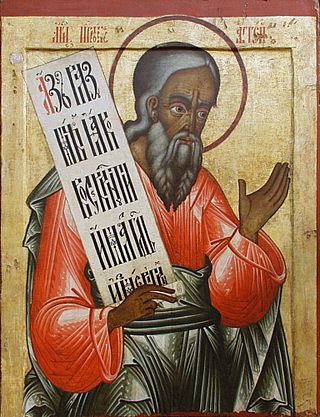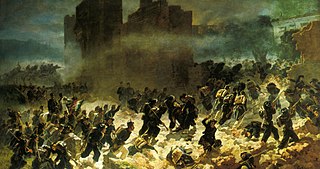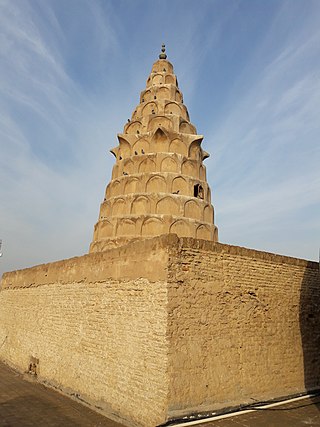This article needs additional citations for verification .(June 2021) |
System of Government Under the Holy Prophet is a book written by Sayyid Abul Ala Maududi. [1]
This article needs additional citations for verification .(June 2021) |
System of Government Under the Holy Prophet is a book written by Sayyid Abul Ala Maududi. [1]

Haggai or Aggeus was a Hebrew prophet active during the building of the Second Temple in Jerusalem, one of the twelve minor prophets in the Hebrew Bible, and the author or subject of the Book of Haggai. He is known for his prophecy in 520 BCE, commanding the Jews to rebuild the Temple. He was the first of three post-exilic prophets from the Neo-Babylonian Exile of the House of Judah, who belonged to the period of Jewish history which began after the return from captivity in Babylon. His name means "my holidays".

Isaiah was the 8th-century BC Israelite prophet after whom the Book of Isaiah is named.

Mecca is the capital of Mecca Province in the Hejaz region of western Saudi Arabia; it is the holiest city according to Islam. It is 70 km (43 mi) inland from Jeddah on the Red Sea, in a narrow valley 277 m (909 ft) above sea level. Its metropolitan population in 2022 was 2.4 million, making it the third-most populated city in Saudi Arabia after Riyadh and Jeddah. Around 44.5% of the population are Saudi citizens and around 55.5% are Muslim foreigners from other countries. Pilgrims more than triple the population number every year during the Ḥajj pilgrimage, observed in the twelfth Hijri month of Dhūl-Ḥijjah. With over 10.8 million international visitors in 2023, Mecca was one of the ten most visited cities in the world.

In religion, a prophet or prophetess is an individual who is regarded as being in contact with a divine being and is said to speak on behalf of that being, serving as an intermediary with humanity by delivering messages or teachings from the supernatural source to other people. The message that the prophet conveys is called a prophecy.

Medina, officially Al-Madinah al-Munawwarah and also commonly simplified as Madīnah or Madinah and known in pre-Islamic times as Yathrib (يَثْرِب), is the capital of Medina Province in the Hejaz region of western Saudi Arabia. It is one of the oldest and most important places in Islamic history. One of the most sacred cities in Islam, the population as of 2022 is 1,411,599, making it the fourth-most populous city in the country. Around 58.5% of the population are Saudi citizens and 41.5% are foreigners. Located at the core of the Medina Province in the western reaches of the country, the city is distributed over 589 km2 (227 sq mi), of which 293 km2 (113 sq mi) constitutes the city's urban area, while the rest is occupied by the Hejaz Mountains, empty valleys, agricultural spaces and older dormant volcanoes.

The Well of Souls, is a partly natural, partly man-made cave located inside the Foundation Stone under the Dome of the Rock shrine on the Temple Mount in Jerusalem. During the Crusader period, it was known to Christians as the "Holy of Holies", referring to the inner sanctum of the former Jewish Temple, which, according to modern scholarship, was probably located on top of the Foundation Stone.

The Ahmadiyya Caliphate is a non-political caliphate established on May 27, 1908, following the death of Mirza Ghulam Ahmad, the founder of the Ahmadiyya Muslim Community, who claimed to be a Prophet, a Messenger, the promised Messiah and Mahdi, the expected redeemer awaited by Muslims. It is believed by Ahmadis to be the re-establishment of the Rashidun Caliphate that commenced following the death of the Islamic prophet Muhammad. The caliphs are entitled Khalīfatul Masīh, sometimes simply referred to as Khalifa. The caliph is the elected spiritual and organizational leader of the worldwide Ahmadiyya Muslim Community and is the successor of Ghulam Ahmad. He is believed by the Community to be divinely ordained and is also referred to by its members as Amir al-Mu'minin and Imam Jama'at. The 5th and current Caliph of the Messiah of the Ahmadiyya Community is Mirza Masroor Ahmad.

Islam is the state religion of Saudi Arabia. The kingdom is called the "home of Islam"; it was the birthplace of the Islamic prophet Muhammad, who united and ruled the Arabian Peninsula. It is the location of the cities of Mecca and Medina, where Prophet Muhammad lived and died, and are now the two holiest cities of Islam. The kingdom attracts millions of Muslim Hajj pilgrims annually, and thousands of clerics and students who come from across the Muslim world to study. The official title of the King of Saudi Arabia is "Custodian of the Two Holy Mosques"—the two being Al-Masjid al-Haram in Mecca and Al-Masjid al-Nabawi in Medina—which are considered the holiest in Islam.
Addas was a young Christian slave boy who lived in Taif, a mountainous area south of Mecca, during the times of Muhammad, the prophet of Islam. Originally from Nineveh, he was supposedly the first person from the western province of Taif to convert to Islam.
Muhammad Hamidullah was an Indian Islamic scholar from the princely state of Hyderabad. He wrote dozens of books and hundreds of articles on Islamic science, history and culture.

The holiest sites in Islam are located in the Arabian Peninsula. While the significance of most places typically varies depending on the Islamic sect, there is a consensus across all mainstream branches of the religion that affirms two cities as having the highest degree of holiness, in descending order: Mecca, and Medina. Mecca's Al-Masjid al-Haram, and Al-Masjid an-Nabawi in Medina are all revered by Muslims as sites of great importance.

Ordinance XX is a legal ordinance of the Government of Pakistan that was promulgated under the regime of General Muhammad Zia-ul-Haq on 26 April 1984 and is meant to prohibit the practice of Islam and the usage of Islamic terms and titles for the Ahmadiyya Community. The ordinance bars Ahmadi, who are deemed Non-Muslims under the Pakistani constitution, from publicly practising the Islamic faith and also disallows them from using any Islamic texts for praying purposes. It is in addition to – but separate from – the 1974 Second Amendment to the Constitution of Pakistan. While the Second Amendment declared that Ahmadis are non-Muslims, the Ordinance prohibits Ahmadis from identifying themselves as Muslims.

The Basic Law of Saudi Arabia is a constitution-like charter divided into nine chapters, consisting of 83 articles. The Basic Law states that the constitution of Saudi Arabia is "the Holy Qur'an, and the Sunnah (Traditions)" of the Islamic prophet Muhammad. However, the Basic Law contains many characteristics of what might be called a constitution in other countries. The Basic Law is per the Sunni Salafi School understanding of Islamic law.

The Capture of Rome occurred on 20 September 1870, as forces of the Kingdom of Italy took control of the city and of the Papal States. After a plebiscite held on 2 October 1870, Rome was officially made capital of Italy on 3 February 1871, completing the unification of Italy (Risorgimento).

Mirza Masroor Ahmad is the current and fifth leader of the Ahmadiyya Muslim Community. His official title within the movement is Fifth Caliph of the Messiah. He was elected on 22 April 2003, three days after the death of his predecessor Mirza Tahir Ahmad.

Ezekiel's Tomb is revered by Jews as the resting place of Ezekiel, an Israelite prophet who was deported from the Kingdom of Judah during the Babylonian captivity and serves as the eponymous protagonist of the Book of Ezekiel in the Hebrew Bible. Historically the oldest and most important Jewish site in Mesopotamia, it is now the location of the Al-Nukhailah Mosque, which was built on top of the original site and holds separate significance for Shia Muslims. The Jewish presence at Ezekiel's Tomb has greatly diminished since the Jewish exodus from Iraq in the 1950s, shortly after the beginning of the Arab–Israeli conflict. The larger complex has been extensively redeveloped since the 2003 invasion of Iraq; it is widely regarded by Muslims to be the resting place of Dhul-Kifl, an unknown Islamic prophet who is often identified with Ezekiel, and work was reportedly underway to convert the site's disused synagogue into a mosque.

Nabi Shuʿayb, known in English as Jethro's tomb, is a religious shrine west of Tiberias, in the Lower Galilee region of Israel, containing the purported tomb of prophet Shuayb, identified with the biblical Jethro, Moses' father-in-law. The complex hosting the tomb is the most important religious site in the Druze religion. A Druze religious festival takes place in the shrine every year in April.

The destruction of heritage sites associated with early Islam is an ongoing phenomenon that has occurred mainly in the Hejaz region of western Saudi Arabia, particularly around the two holiest cities of Islam, Mecca and Medina. The demolition has focused on mosques, burial sites, homes and historical locations associated with the Islamic prophet Muhammad, his companions, and many of the founding personalities of early Islamic history by the Saudi government. In Saudi Arabia, many of the demolitions have officially been part of the continued expansion of the Masjid al-Haram at Mecca and the Prophet's Mosque in Medina and their auxiliary service facilities in order to accommodate the ever-increasing number of Muslims performing the pilgrimage (hajj).
Public holidays in Palestine.

A sitara or sitarah is an ornamental curtain used in the sacred sites of Islam. A sitara forms part of the kiswah, the cloth covering of the Kaaba in Mecca. Another sitara adorns the Prophet's Tomb in the Al-Masjid an-Nabawi mosque in Medina. These textiles bear embroidered inscriptions of verses from the Quran and other significant texts. Sitaras have been created annually since the 16th century as part of a set of textiles sent to Mecca. The tradition is that the textiles are provided by the ruler responsible for the holy sites. In different eras, this has meant the Mamluk Sultans, the Sultans of the Ottoman Empire, and presently the rulers of Saudi Arabia. The construction of the sitaras is both an act of religious devotion and a demonstration of the wealth of the rulers who commission them.